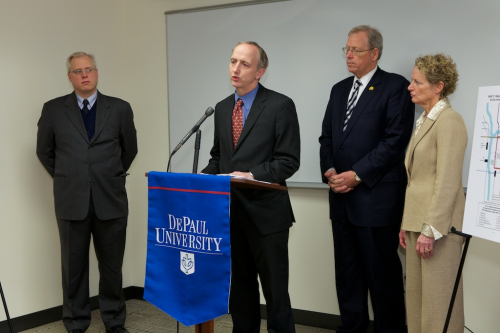Dec 10, 2012
New Study Shows Failure to Invest in Transit Could Derail Chicago Economy
New Study Shows Failure to Invest in Transit Could Derail Chicago Economy
CHICAGO – The deterioration of Chicago’s public transit system could wreak havoc on the region’s economy if adequate investments aren’t made soon, according to a new study released today by the Illinois Chamber of Commerce. The study was led by nationally known transportation analyst Joseph Schwieterman, Ph.D., of DePaul University’s Chaddick Institute for Metropolitan Development.
Illinois Chamber President and CEO Doug Whitley, Illinois Rep. Elaine Nekritz (D-Northbrook) and Chicago-area business leaders joined Schwieterman at DePaul University and called on state lawmakers to provide badly needed capital funding for critical public transit projects.
“Transit is the backbone of Chicago’s economy,” Whitley said. “Without it, we are paralyzed when it comes to attracting the employers, jobs and investments of tomorrow.”
The first-of-its-kind study – which synthesizes the findings of more than 40 separate reports and analyses over 20 years – reveals a transit system that affects everything from property values and job creation to Chicago’s global identity.
That same system also faces rapidly growing ridership, a towering backlog of capital projects – up 20 percent from just two years ago – and chronic investment shortfalls.
“Nearly two-thirds of employees in downtown Chicago arrive by bus or train,” Schwieterman said. “Without a strong transit network, the city will lose the vitality of its downtown area, which is home to more than half a million jobs. Overall, the deterioration of the system will impose more than $500 million – or $175 per household – in costs annually on highway and transit users, primarily as a result of higher travel times and congestion.”
The study’s findings also show that failure to keep the system operating in a state of good repair will:
Cost the region $1.30 to $1.90 for every dollar not invested in adequately maintaining the mass transit system. This includes estimates of costs pertaining to health, land use, and the public image of the region.
Lead to longer travel times and reduced transit schedules and reliability. Chicago’s transit system currently has some of the oldest vehicles and infrastructure in the nation. Result in ridership losses of at least 15 to 20 percent.
Conversely, making needed investments will provide an estimated $1.5 billion in annual benefits by giving employers access to a larger and more qualified workforce pool. Regional models show direct job gains of 18,000 to 41,000 are possible as a result of these improvements.
In an academic symposium after Monday’s news conference, Schwieterman and study co-author Laurence Audenaerd, Ph.D., discussed their findings with transportation experts and stakeholders. To address the region’s transit issues, the two recommended a predictable funding stream of $2 billion annually over a multi-year period.
The full study can be found online at: http://las.depaul.edu/chaddick/ResearchandPublications/index.asp
About the Illinois Chamber
The Illinois Chamber of Commerce promotes the interests of Illinois business by working to improve the state’s business climate. The Illinois Chamber aggressively advocates for legislation and public policies that support economic growth, and is a source of timely and reliable information on matters important to its members, Illinois employers and the general public. The Illinois Chamber also provides effective programs and services to its 3,500+ members to meet their business needs, including immediate answers to tax and human resources concerns and access to compliance seminars and publications. www.ilchamber.org
About the Chaddick Institute
Founded in 1993, the Chaddick Institute for Metropolitan Development at DePaul University advances the principles of effective land use and transportation. The Institute offers planning, design and development professionals a forum to network and share expertise on urban planning issues through workshops, conferences and policy studies. The Institute was endowed by and named for Harry F. Chaddick, a renowned businessman who was a pioneer in post-war real estate development in Chicago and around the nation.

Joseph Schwieterman, director of DePaul’s Chaddick Institute for Metropolitan Development, discusses chronic underfunding of mass transit infrastructure in Chicago. Joining him for a Dec. 10 news conference were Doug Whitley, president of the Illinois Chamber of Commerce which commissioned the study, and Illinois Rep. Elaine Nekritz.
